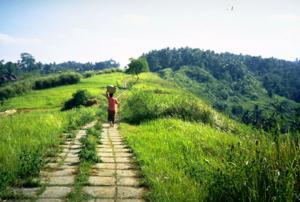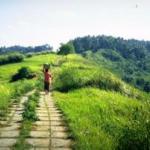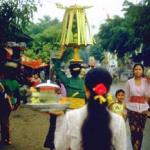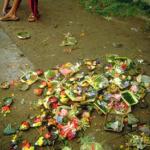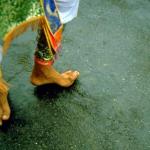Bali: Once Upon A Time
Soon we'll cross the International Date Line and never touch ground on Monday, May 26, 1997, and I have the same feeling of fleeting nostalgia that I have at the end of every calendar year. Something about the nature of time, of never reliving a moment exactly as before, makes me want to hold on to it even more. I was almost twenty-three the last time I traveled to Bali during a 9-month solo journey throughout Southeast Asia featuring one unpredictable adventure after the next.
Five years have passed. I am now twenty-eight and have been dreaming about surrounding myself again with terraced green rice fields, gamelan music and Hindu temple ceremonies. A large part of me wants this experience to be very similar to the last one. But I just read two recent articles about the impact of tourism on Bali and environmental degradation to the island, and I'm fully aware that I'm contributing to it. Bali's preservation, or lack thereof, is a big issue among travelers and Indonesians alike. Tales of Kentucky Fried Chicken and Givenchy in the southern coastal town of Kuta are raising more than a few questions about Bali's future. On this voyage I'm prepared to find more sprawl and spoil.
I'm on a Garuda flight from Los Angeles and I'm guessing it's about 4:30 a.m. On my last trip to Bali, my watch broke and I soon learned to tell time by the position of the sun and the heat of the day. And that's when jam kerat, loosely translated as "to flow in time" in the Taoist sense, started to have an effect on me. It's coming back. The more hours I spend on this plane toward my destination, the more I feel myself leaving behind the frenetic Western world and returning to a calmer, more intuitive, more self-reliant traveling lifestyle in which I need to think only about the present day.
I sleep well my first night in Bali until I awake at about 5:30 or 6 in the morning to a tiny sound outside my window. The two young men who work at the Nuriani family homestay are quietly placing a thermos of hot tea and a jar of sugar on the bamboo porch table. I hear a faint clink as they set a little spoon on each saucer before they silently creep back downstairs. By this time, a bit of light is starting to peer into the dark sky. Acting as conductor, an audacious rooster instigates an animal cacophony to announce the dawn. Chickens, birds, bugs, dogs, frogs and an intermittent catfight provide a lively background din. I pour myself a cup of hot tea and watch the light form around Gunung Agung, Bali's holiest mountain, to the east.
In the morning I wander around Ubud. Located inland and north of the capital Denpasar, Ubud is a busy enclave of shops and people selling woodcarvings, musical instruments, clothing and silver jewelry made locally. Every few yards along the sidewalk is a small offering of flowers, bits of cooked rice, or a cookie nested in a woven palm frond or banana leaf. I step around them, careful not to upset the delicately balanced sticks of burning incense. Skulking Balinese dogs, emaciated with mangy fur and hanging nipples, will eat the offerings later on.
While I dodge motorbikes, people and rusty, cramped bemo vans, I can see where tourism has expanded since my last trip: by creeping into the rice fields and surrounding villages. Bungalows and hotels are sprouting where rice used to grow. Clearly, the lure is that it is much easier and a lot more lucrative to cater to tourists and to abandon a farming lifestyle. The material results in the quickest, most obvious path of "catch up with the West" take the form of DKNY and Chanel T-shirts, new Nike sneakers and expensive cars and jeeps.
Today I will try to find Made (Ma-dé), a Balinese woman who lives in Bankiang Sidem, a small village that sits up high along a ridge. I once lived with Made, her husband and their eight-month old daughter, Wayan, for two months in their small home. Although I didn't do such a good job of keeping in touch over the years, Made is often on my mind. She has no idea that I'm here. I hope she hasn't moved.
Bankiang Sidem is about forty minutes by foot from Ubud and I fill a water bottle for my walk. It's now late morning and the path will be exposed to the sun most of the way. Five years ago I walked this way so many times I could do it in my sleep. I remember that the first landmark, a warung that sells delicious vegetarian food, marks the turnoff from the main road. I arrive and am instantly disoriented. The warung is gone and next to it is a large chiseled marble sign advertising luxury bungalows in the direction I'm headed. My stomach tightens.
I walk down stone steps to the path the way I remember it. An official looking gentleman appears out of nowhere and asks where I'm going. I explain that I'm off to visit friends in Bangkiang Sidem. He points to a path on the other side of the river. But I know for certain that I used to walk with the river on my left, not my right, so I stand firm, "No, it's this way", pointing straight ahead. He tells me that so and so lives down there and "this" way is private. Politely I say I'll take the path anyway and he lets me pass.
The man is indeed right. Someone has built a house just beyond the sacred bathing place where two rivers meet. Appalled, I keep walking right onto the property and then I see in the distance the little cement building used for drying tall grass. The second landmark. Relieved that my memory hasn't failed me, I notice a new path on the other bank that joins the one I'm on.
The path winds through tall grasses, ascending along a ridge. From here the sides slope steeply down to a river on each side. To my right are terraced rice fields and areas thick with banana and coconut trees. To my left on the opposite slope are clusters of luxury hotels, bungalows and swimming pools built into the side of the hill. I try to remain calm as I look to the ground at the foot path that used to be a two-foot wide dirt trail; it is now over twice as wide and patterned with cement.
I hear a strange noise and look up. Two tourists on mountain bikes come careening down the path and I jump out of the way. They are followed by another and another, all saying hello. I count twenty-five bicyclists followed by two Balinese guides. Scarlet and bright green dragonflies hop along the sharp points of tall grass and I keep walking, with visceral urgency to get to the village.
On the far side of the ridge the shade is welcoming and I pass a thatched hut shop selling crackers, peanuts, soap, drinks, flip-flop sandals and necessities. I breathe a sigh of relief because it all looks the same. Next I come upon a woman selling her son's paintings. I recognize her and sit for a couple of minutes to answer her questions before excusing myself. "Made still lives next door?" I ask. Disappointed that I'm not going to buy a painting, she nods and points the way.
The entrance to Made's garden now has a narrow ramp for a motor bike and a brick and stone archway with a little sign saying "Suchik House, bungalow for rent". I smile knowing that the little once-unfinished house in the back of the garden is now providing another income. I walk into the familiar garden of bougainvillea, frangipani, fruit trees and a grazing cow, and stop in front of the porch.
"Made?...Made?" The swinging front door is ajar and I hear a rustling before a woman in a floral cotton dress comes outside with a baby nursing her breast. I grin.
"Kim! Kim where have you been? Five years no see Kim!" She's as elated as I am and I hold her tight, careful not to squish the baby. "Who's this?" I run my hand down chubby folds of ultra-soft skin. "Made too?" I ask, since this name means "second born." She is called Deci and she looks just like her older sister did. And with that, the now almost six-year old Wayan pokes out from behind the door, shy and beautiful. Made explains to her daughter in Balinese who I am. Huge brown eyes scan me over and not until some minutes later, when I hand her a little plastic jar of bubbles and a wand, does a slow smile reveal a gap and the tips of two sprouting front teeth.
Because they have a paying guest, I do not stay with Made and her family this time, but I spend many days and evenings sitting on the tiled porch floor chatting over coffee and tea and meals of rice, bean sprouts, tofu and chilis. My Bahasa Indonesian is passable but Made's English is very good from working for fifteen years for a German expatriate named Uli. We talk about how much Bali has changed, even in five years. The people in Bangkiang Sidem village now have electricity and running water, which saves Made from hiking down the steep ravine and back while balancing a full bucket of water on her head and a baby on her hip. As for the convenience of electricity, I'll admit I miss the lanterns that we once used to light the house.
Up at Made's house the tourist industry has yet to make inroads. One of Wayan's toys is a purple plastic Grimace monster from a Kuta McDonald's Happy Meal Box, a token from Uli. I make a small joke about the figurine in my hand and Made asks what McDonald's is. I think for a few moments because I'm not sure I want to answer.
One early evening as I walk the path to Made's I have the ridge all to myself. It looks like a thundershower is brewing and I wouldn't mind being poured on here; it hasn't rained for days. Instead the sky remains purple-grey and the view is especially beautiful in this light. Not the vibrant green of mid-day, but a lush green that's darker and smoky. Tonight at sundown, as she does every fifteen days, Made will place special offerings around her home. Like the other women in her village, she has been preparing these gifts to the gods for a few days.
I arrive and we each bathe by using a scoop ladle to pour cool water over ourselves, and wrap sarongs tightly around our waists. With Wayan at my side, I carry Deci to the small family temple and we silently watch Made place offerings to Brahma, Vishnu and Siva, plus several other Hindu spirit protectors: a river god, a god who watches over the buried placentas of her two daughters, a god whom she asks to not make trouble in the village, a god who protects the house and then one for the cow and pig she's raising. She blesses each offering of expertly woven palm leaves filled with flowers, incense, a handmade basket of cooked rice, a hard-boiled egg and the red apples I brought as a gift. With a white flower petal between her first and middle fingers, she dips them into a glass of holy water and sprinkles the offerings while whispering some words. There are two sets of offerings, one placed up high and one down low, for the good spirits and the bad spirits respectively, so no one feels left out. The baby falls asleep in my arms so Made puts her to bed and then I carry a large metal tray and follow her to the back of the garden where she places more offerings and incense on stone pedestals.
About an hour later Made collects all the offerings and we sit on the porch and begin peeling apart the baskets of rice and bite into the eggs. "Are you sure it's okay to eat these now, the Gods are finished?" I ask, not wanting to invoke the hungry wrath of bad spirits. Looking at me the way any expert would a novice, "Sudah," she says confidently: "They're done."
In Made's village I am somewhere far, far away. The fact that I'm leaving tomorrow weighs heavily on my mind. I am preparing to say goodbye to Made and I am conflicted because I don't know when, or if, I will return to Bali. In a short five years it has changed dramatically and although some changes may be for the better, tourism's relationship with the environment and customs and traditions that have been practiced for centuries seems slippery.
Made is slowly creating a nest egg because, like her neighbor, she too wants to build a shop in the front of her garden. She already has a pile of bricks and roof tiles that she adds to when there's extra money. Despite my ambivalence when we part, she seems to know that I'll be back to Bali one day. She lets me know that she'll always be here on the land passed to her by her family. This is something I can hold onto.
 ThingsAsian
ThingsAsian